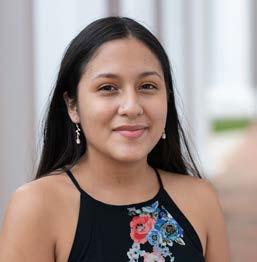
1 minute read
SUMMER INTERNSHIPS
With a return to a more normal summer, our students participated in an incredible array of summer internships in 2022. Below are just a few examples of how some of our students spent their summer.



Belen Delgado Mio ’23
Belen delgado mio ’23 Was an intern for the institute for energy and the environment (IEE) at Vermont Law and Graduate School (VLGS), where she worked on three research projects: Beneficial Electrification (BE) within Agriculture, Solar on Marginal Farmlands and Farmland Solar Policy. BE is the process of electrifying appliances, machines and technologies that are traditionally powered by fossil fuels. Her project was focused on applying BE to appliances technology frequently utilized in agriculture, and she researched business models between farmers, land trusts and solar developers to develop solar arrays on farmland. Her responsibilities included policy and legal research, interviewing stakeholders, and presenting her findings to energy clinicians and IEE staff.
Jules Seay ’23
Jules seay ’23 received a research felloWship at rutgers university from the National Science Foundation’s REU program (Research Experience for Undergraduates). Her lab focused on geobiology and ecosystem ecology, and her independent research was on utilizing Northern Hardwood tree species to promote forest health while sequestering carbon to combat climate change. At the end of the fellowship, Seay presented her work and developed a forest management recommendation for Duke Farms, recommending what trees should be planted to promote afforestation.

Clara Albacete ’23
last summer, clara alBacete ’23 Went to argentina to complete research for her upcoming honors thesis on yerba mate. Mate is a tea-adjacent beverage that can be found growing in northern Argentina, Paraguay and southern Brazil, and is consumed in those countries, as well as in Uruguay. As a lifelong mate drinker herself, Albacete was thrilled to learn more about the cultural traditions behind the drink and the ecological properties of the location-specific plant. She was able to travel to Buenos Aires, San Juan, Córdoba, Corrientes, Chaco, Misiones and Iguazu Falls, located on the border between Argentina and Brazil.
Madison Williams ’23
last summer, Williams Worked With professor david harBor on regenerative agriculture research focused on soil health. They conducted a comparative analysis between two adjacent farms: SideOats Farm and Verdant Acres Farm in Raphine. They tested soil compaction and water infiltration in the field and collected soil samples to test their differences in carbon content, moisture and aggregate stability, among other things. Williams also visited the Rodale Institute in Pennsylvania, an organic farm which conducts research about sustainable farming practices, where she learned about their soil testing methods, along with new initiatives and projects.







